Table of Contents
Here is how to interpret the cleaning clause in your lease agreement in Sheffield, UK:
Read the whole lease agreement
Read the whole lease agreement, especially the sections related to maintenance, cleanliness, and your responsibilities as a tenant.
Many times, leases mention that the property has to be kept in a "reasonably clean" condition. It refers to regular cleaning that prevents dirt from building up. In some leases, there are clauses about having to hire professionals to clean at the end of the lease or from time to time.
Detect tenant responsibilities
Typically, tenants are responsible for regular upkeep, like vacuuming, dusting, and cleaning appliances. They should pay attention to specific areas like carpets, windows, and bathrooms.
End-of-tenancy cleaning
Commonly, leases require tenants to leave the property as clean as it was at the start of the tenancy.
Understand the effects of non-compliance
The lease may mention that the tidying costs should be deducted from the security deposit when the property is left in poor condition.
If any terms aren’t clear, contact the landlord or letting agent. Also, keep records of correspondence for future reference.
Review significant laws and regulations
Go over the tenants' rights in Sheffield, UK, especially those related to cleanliness and maintenance standards. Check out the local housing regulations to complete the information.
General upkeep
Specific areas
Tenants should regularly clean carpets and floors, windows (inside and outside), furniture and fixtures.
Condition at Move-out
Specific cleaning tasks
Landlords or letting agents may run periodic inspections to make sure that the property is properly maintained. Tenants should receive at least 24hours notice before the inspection.
Read the lease agreement about your clearing-up obligations and whether you have to hire professional cleaners or not.
You need cleaning solutions, microfiber cloths, sponges, mops, buckets, and a vacuum cleaner. You may also need specialized cleaners for ovens, carpets, or limescale removal.
Make a detailed list of clearing up tasks and schedule enough time to complete the tidying.
Remove all personal items from the property and dispose of unwanted items according to Sheffield City Council's waste disposal guidelines.
If the lease specifies professional cleaning, hire professionals. There are reputed cleaners who will offer a receipt for proof of service.
Take photos of the cleaned property as evidence of its condition before you move out. Use the inventory checklist from the beginning of the lease.
Notify your landlord or letting agency that you have cleaned the rental and it is ready for inspection. You should be present during the final inspection.
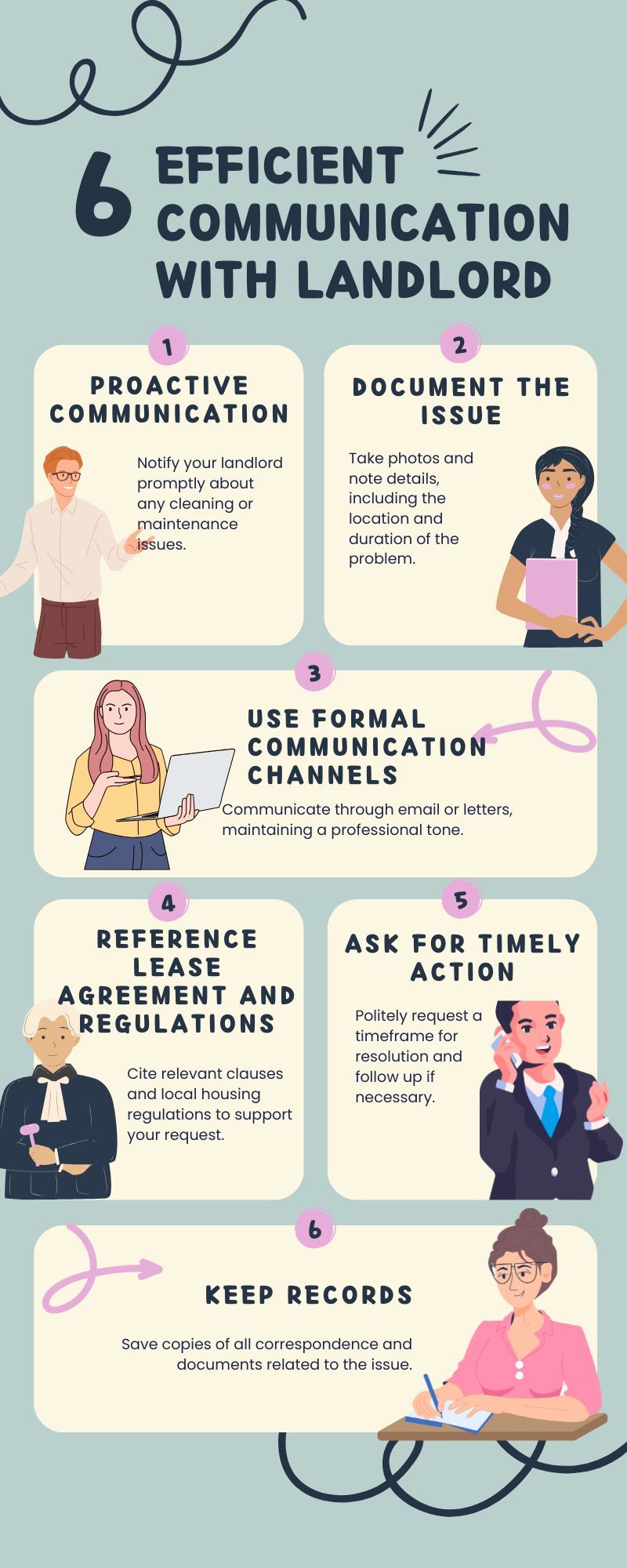
Be proactive
Communicate cleaning issues as soon as they occur. Inform the landlord about the rental's condition.
Document the issue
Take photos of the problems (mould, stains, areas that need repairs) to offer visual evidence. Describe the issue, including its location, and for how long it has been a problem.
Use formal communication channels
Use e-mail or letters to inform about the problems. Always keep a polite and professional tone in communications. Clearly explain the problem and suggest solutions. Ask the landlord about his recommendations to solve the problems.
Reference lease agreement and regulations
Mention the clauses in the lease agreement related to maintenance and cleanliness to support the request. You may also specify any local regulations or guidelines that pertain to the issue, such as Sheffield City Council’s housing standards.
Ask for timely action
Politely ask for a timeframe for when the problem will be addressed. Follow up if you don’t receive an answer within a reasonable time.
Keep records
Save copies of all e-mails and letters with the landlords. Be reasonable, as some problems may take time to resolve.
Know when to take action
Contact local tenant advocacy groups when the landlord doesn’t solve the cleaning issues within a reasonable timeframe. Organizations such as Shelter or Citizens Advice in the UK can provide guidance. For health-threatening problems, you may have to report the problem to Sheffield City Council’s Environmental Health Department.
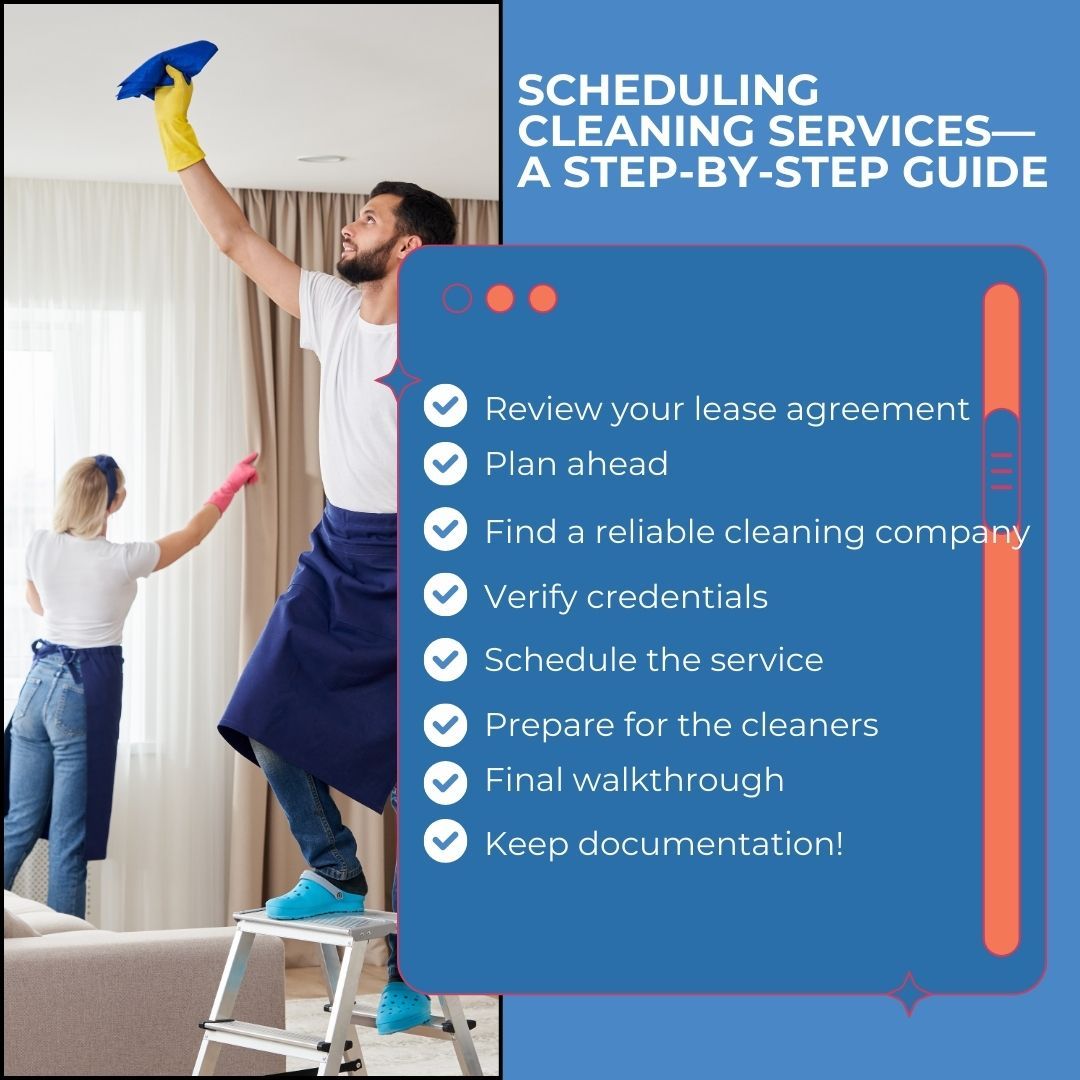
See if you have to hire professionals to clean at the end of the lease. Note the specific areas that require specialized care (carpets, oven, window washing).
Plan to tidy up right before you move out—a few days before the final inspection.
Ask family, friends, and letting agents about a reliable company in Sheffield. Contact several companies, get detailed quotes, and see that there are no hidden fees.
Check out the insurance and certification of the company. Should any damage occur during clearing up, you will be protected. See if the company offers guarantees and warranties for their work. The top companies in Sheffield will come for re-clean, for free, if you're not happy with the results.
A reliable company is available 7 days a week and willing to come whenever suits you the most.
Remove personal belongings from the property before the cleaners arrive. See that the cleaners have access to the property. You might have to be present or leave a key (to a neighbour or the letting agent).
Check out the rental to see if everything was cleaned as promised. Contact the cleaning company if you find any issues.
Keep documentation!
A trustworthy company would hand you a receipt and documentation proving that professionals cleaned the rental. To prove the condition, you may take photos of the cleaned property.
Proof of compliance
As many lease agreements state that tenants should return a clean property, professional cleaning is necessary most of the time. Documentation works as proof that you have completed the requirements. In case of disputes, the records protect you legally.
Deposit return
The cleaning records work as evidence if the landlord claims that the property wasn’t in proper condition. With receipts and documentation, tenants can expedite the return of the deposit.
Communication with landlord
Informing the landlord with documented proof of professional services improves transparency and the relationship with the landlord. Clear records prevent misunderstandings about the rental's condition when moving out.
Ensure quality
Receipts and documentation also contain details about the techniques and products. If there are any problems, the detailed records allow prompt solving with the cleaning company.
Future references
Having records of the clearing-up services helps you better understand the level of cleanliness landlords require. Being able to maintain the rental clean helps you for future rental applications.
Avoid additional costs
If you have documents from the cleaners, the landlords won’t be able to ask for unwarranted cleaning charges.
Handle health and safety concerns
Records help in managing health or safety concerns related to cleanliness, like mould or pest issues.
Take clear, dated photos of the property, collect receipts from professional services, and keep records of all correspondence with the landlord regarding cleaning.
Use a calm and professional tone when contacting the landlord. Ask for details as regards tidying at the end of the lease.
Offer to manage tidying concerns by hiring professionals to re-clean specific areas. Be ready to negotiate. For instance, if the landlord insists on additional tidying ask to share the cost.
Should you not be able to agree, suggest an independent inspection for unbiased opinion on the property's condition. Think about mediation services to resolve disputes. Organizations like the Property Ombudsman or local tenant associations in Sheffield can offer mediation.
If the dispute is related to the deposit, you should contact the deposit protection scheme. In the UK, deposits must be held in a government-approved scheme such as the Deposit Protection Service (DPS), MyDeposits, or the Tenancy Deposit Scheme (TDS). They can provide a dispute resolution service.
You have to provide the scheme with all your evidence, photos, receipts, and correspondence. The scheme will review both sides and make a binding decision.
If the dispute isn’t solved, seek advice from a legal expert or a tenant advisory service like Shelter or Citizens Advice in Sheffield. They can provide guidance on your rights and the best course of action.
Ask your landlord for clear instructions on what is expected before moving out. Ask for a final walkthrough with the landlord to promptly address any cleaning issues.
Get quotes from several companies and keep in mind that specialized services (cleaning the carpets, oven, sanitization, etc) are charged extra. Set up a contingency fund for unexpected cleaning problems.
Professional cleaning services
DIY cleaning cost
Landlords may not return the deposit in full if the property isn’t in the requested condition. You may contest the deposit deductions with clear records.
The key areas to clean before the final inspection are:
Final touches
Right to a Clean and Safe Property
Landlords are legally obligated to ensure that the property is in a good state of repair and clean at the start of the tenancy. The property meets health and safety standards.
Tenants have the right to live in a property that is free from significant health hazards and unsafe conditions. Mould or pest infestations and similar issues should not exist.
Right to a fair inspection at the end of the lease
Tenants should receive reasonable notice of any final inspection or check-out appointment. They have the right to be present during the final inspection. This way they can promptly address any concerns.
Right to dispute unfair charges
If the landlord deducts money from the security deposit for cleaning, tenants have the right to dispute these charges if they believe they are unfair or unjustified.
Right to documentation
Tenants have the right to request receipts or invoices for any services performed, whether by professional cleaners or for any charges deducted from the deposit. Tenants can ask for proof if the landlord claims that the property was left in improper condition.
Right to a detailed cleaning clause
Tenants should have a clear understanding of their obligations as outlined in the lease agreement. The cleaning standards required should be reasonable and reflect what can be expected for regular wear and tear.
Right to professional standards
If landlords expect professional cleaning, tenants have the right to expect that the service is performed to a professional standard. Costs for professional cleanups should be reasonable and tenants should not be charged excessively.
Right to seek advice
Tenants have the right to seek advice from organizations such as Shelter, Citizens Advice, or local tenant associations. In case of disputes, tenants can look for legal advice to see the potential courses of action.
Right to safe and legal practices
Landlords cannot make unlawful deductions from the deposit and they must tenants' privacy and access rights. They cannot enter the property without proper notice or tenant consent during the tidying process.
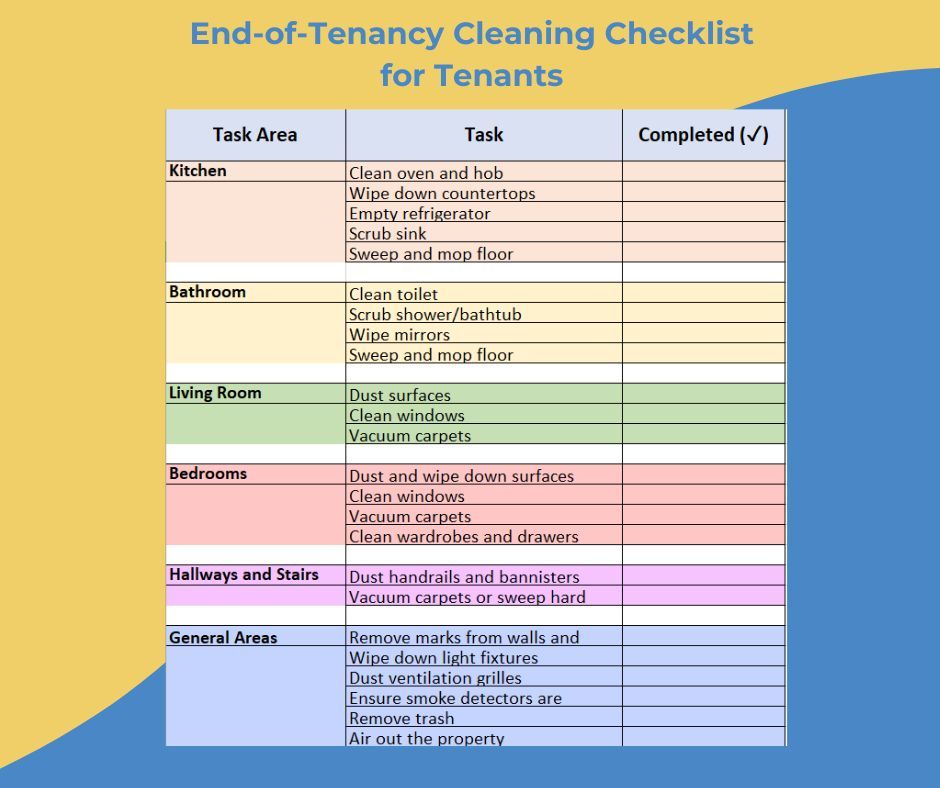
Appliances
Cabinets and Drawers
Countertops and backsplash
Sink
Floor
Sweep and mop the kitchen floor. Ensure all food particles and stains are removed.
Toilet
Sink and Faucet
Shower/Bathtub
Mirrors and cabinets
Floor
Surfaces
Windows
Floor
Furniture
Surfaces
Windows
Floor
Wardrobes and drawers
Remove all personal items and clean inside wardrobes and drawers. Wipe down the interior.
Surfaces
Floor
Vacuum any carpets or rugs and sweep and mop hard floors.
Walls and doors
Light Fixtures
Ventilation
Smoke detectors
Remove trash
Air Out
Final Inspection
Read the lease agreement to understand your cleaning obligations and any specific requirements for moving out. Always refer to the inventory report from the start of your tenancy to understand the condition of the property and the expected standard.
Regularly clean the property to prevent build-up of grime and dirt. Address spills, stains, and minor issues immediately.
Fix minor repairs and maintenance issues as they arise, such as loose handles, small holes in walls, or broken fixtures. Prompt action can prevent these issues from worsening. Notify your landlord of any major issues or damage that occur during your tenancy. You avoid disputes over responsibility.
Prepare for the move-out cleaning well in advance of your departure date. Use the detailed checklist (like the one previously provided).
Perform a deep clean of the property before you move out. Focus on areas that are often overlooked, such as behind appliances, inside cupboards, and under furniture. Consider hiring professionals to meet the required standard.
Apartments and condominiums
Single-family homes:
Shared Housing (e.g., student housing, co-living spaces):
Look for reviews and ratings on platforms like Google, Yelp, or Trustpilot. Seek recommendations from friends, family, or colleagues who have used professional help.
Make sure that the company is licensed and insured. Select a company with experience cleaning at the end of the lease, as it's familiar with the specific requirements and standards.
Get a detailed quote that includes all the services to be provided and the total cost. Reputed companies in Sheffield don’t have hidden fees. Compare quotes from multiple companies.
Specify what areas and tasks require cleaning. Provide the hired company with a checklist of your requirements, especially if you have specific needs or areas that require special attention. Confirm what is included in the service (e.g., clean inside appliances, windows, carpets) and what might be excluded.
Ask the company to use environmentally friendly products, if you prefer it that way. Get the information you need about the methods and equipment.
Schedule the service well in advance, especially if you are moving out during a busy period. Ask about the number of cleaners that will be sent and the estimated time required for the job. A larger team might complete the tidying faster.
Learn how long the procedures will take and whether additional time or costs will be added if the job takes longer than expected.
Check out if the company offers a satisfaction guarantee or follow-up service if the job is not up to standard. Understand the policy for re-cleaning if you or the landlord are not satisfied with the initial results.
Get a written contract that outlines the scope of work, costs, and any terms related to re-cleaning or satisfaction guarantees. Review the terms and conditions carefully, including payment terms and any cancellation policies.
Run a final walkthrough with the cleaners. The most reputed companies in Sheffield, UK will stay for the inspection. Take photos of the cleaned areas to have a record of the property’s condition.
Retain all receipts and documentation related to the cleaning service. This can be useful for resolving any disputes and for your records.
Understand shared responsibilities
Establish a cleaning schedule that includes all housemates. Agree on who will clean which areas and how often. Clean shared areas like the kitchen, bathrooms, and living rooms, as these are used by everyone and need regular attention.
Coordinate with housemates
Discuss cleaning responsibilities with your housemates and set clear standards for cleanliness. This prevents misunderstandings and ensures consistency.
Regularly deep clean common areas
Create a rotating cleaning schedule for common areas to evenly distribute the tasks among all housemates.
Kitchen
Bathrooms
Living areas
Maintain personal areas
Each tenant should clean their own private room to maintain personal hygiene and order.
Promptly address issues
Tackle spills, stains, and messes immediately to prevent them from becoming more difficult to clean. Notify housemates or the landlord about any issues with shared cleaning responsibilities or necessary repairs.
Consider professional help
If disagreements arise or if the cleaning tasks are too demanding, consider hiring professional cleaners for shared areas. Discuss and agree on how to share the cost of professional services.
Documentation and agreements
Document agreed-upon cleaning responsibilities and schedules. Make a checklist for shared areas to ensure all tasks are completed regularly.
Handle disputes fairly
Openly address any cleaning disputes. Use a group meeting or discussion to resolve issues. If conflicts persist, ask for a neutral party or mediator to help facilitate a fair resolution.
Regular Inspections
Conduct regular inspections of common areas to ensure they meet cleanliness standards and that everyone is fulfilling their responsibilities.
Health and hygiene
Focus on high-touch areas such as door handles, light switches, and kitchen surfaces to reduce the spread of germs and bacteria. Ensure efficient ventilation in shared areas to keep the environment fresh and reduce moisture build-up.
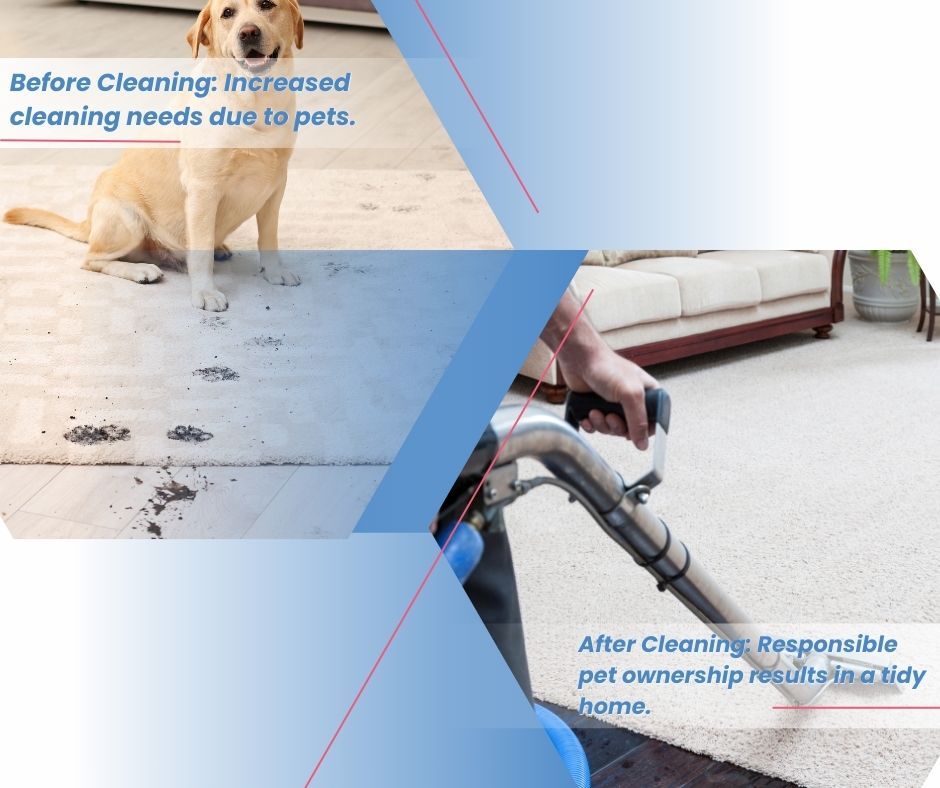
Increase cleaning needs
Pets, especially those with shedding fur, can leave hair and dander on carpets, upholstery, and floors. This requires more frequent vacuuming and deep cleaning. Also, pets may have accidents, such as urine or vomit, which can cause lingering stains and odours.
Carpets and rugs
Upholstery
Floors:
Bedding and furniture:
Walls and doors:
Special considerations
Use the landlord's detailed cleaning checklist outlining the areas and tasks that need to be completed.
Hire a dependable company as their operatives are experts in cleaning the properties to perfection. They carry the expertise, skills, equipment, and products to meet the highest standards.
Before the tidying begins, conduct a pre-cleaning inspection with the tenant or cleaning company representative. This will help identify any areas of concern or specific requirements.
Document the condition of the property before and after the cleaning by taking photos or videos. This visual evidence can be helpful in case of any disputes or disagreements regarding the results.
If you notice any areas that have been missed or not cleaned to the required standard, promptly notify the cleaning company or landlord and request a re-clean of those specific areas.
If possible, attend the final inspection with the landlord or property manager. This allows you to address any concerns or issues they may have regarding the cleanliness of the property.
Refer to your tenancy agreement for any specific cleaning requirements or standards outlined by the landlord or property management company.
Maintain open communication with the landlord or property manager throughout the cleaning process. Address any concerns or questions they may have, and ensure that you understand their expectations.
Conduct a final walkthrough
Perform a comprehensive walkthrough of the property, and every room (bathrooms, bedrooms, kitchen, living areas) to ensure that all cleaning tasks have been completed to a high standard.
Cross-check with the cleaning checklist
Compare the results of the cleaning with the checklist that was created and make sure that all tasks have been completed. Check off each item on the checklist to confirm that nothing has been missed.
Address any issues
Perform any touch-up cleaning required for areas that may have been missed or where additional attention is needed. Address any minor repairs or maintenance tasks that you noticed during the walkthrough.
Check out the utilities and appliances
Ensure that all appliances (e.g., fridge, oven, dishwasher) are clean and properly functioning properly. See that utilities such as water, electricity, and gas are in good working order.
Prepare for the final inspection
Inform the landlord or letting agent that the cleaning is complete and schedule a final inspection if required. Don’t forget to provide relevant documentation.
Review inventory report
Review the inventory report to ensure that the property’s condition matches the initial report. See if there are any changes or discrepancies from the inventory report and address them accordingly.
Remove personal belongings
Tenants are responsible for removing all of their personal belongings, including furniture, appliances, and any remaining items, from the property before handing over the keys. Check for any items that might have been left behind and collect them before leaving.
Return keys and access devices
Tenants must return all keys, access cards, garage door openers, and any other access devices to the landlord or property manager.
Provide a forwarding address
Tenants should provide their landlord or property manager with a forwarding address for any future correspondence or the return of their security deposit.
Utility transfers or cancellations
Tenants may need to transfer or cancel utility services, such as electricity, gas, water, and internet, in their name and provide final meter readings to the utility companies.
Mail forwarding
Tenants should arrange for their mail to be forwarded to their new address by submitting a change of address form with the postal service.
Cleaning any missed areas
If the tenant notices any areas that were missed or not cleaned to their satisfaction during the final inspection, they may need to clean those areas themselves or arrange for additional cleaning services.
Handle security deposit
Follow up with the landlord or letting agent regarding the return of your security deposit. Ensure that any deductions are justified and documented. If there are any disputes regarding deductions from your security deposit, use the deposit protection scheme’s dispute resolution service to resolve them
Final clean-up
Remove any remaining trash or items from the property and ensure that the property is left clean and clear. Ensure that the property is in a presentable condition for the final inspection. If necessary, make any last-minute adjustments.
Confirm move-out procedures
If required, sign any move-out documentation or agreements with the landlord or letting agent. Make sure that the move-out date is confirmed and that you have completed all procedures related to your departure.
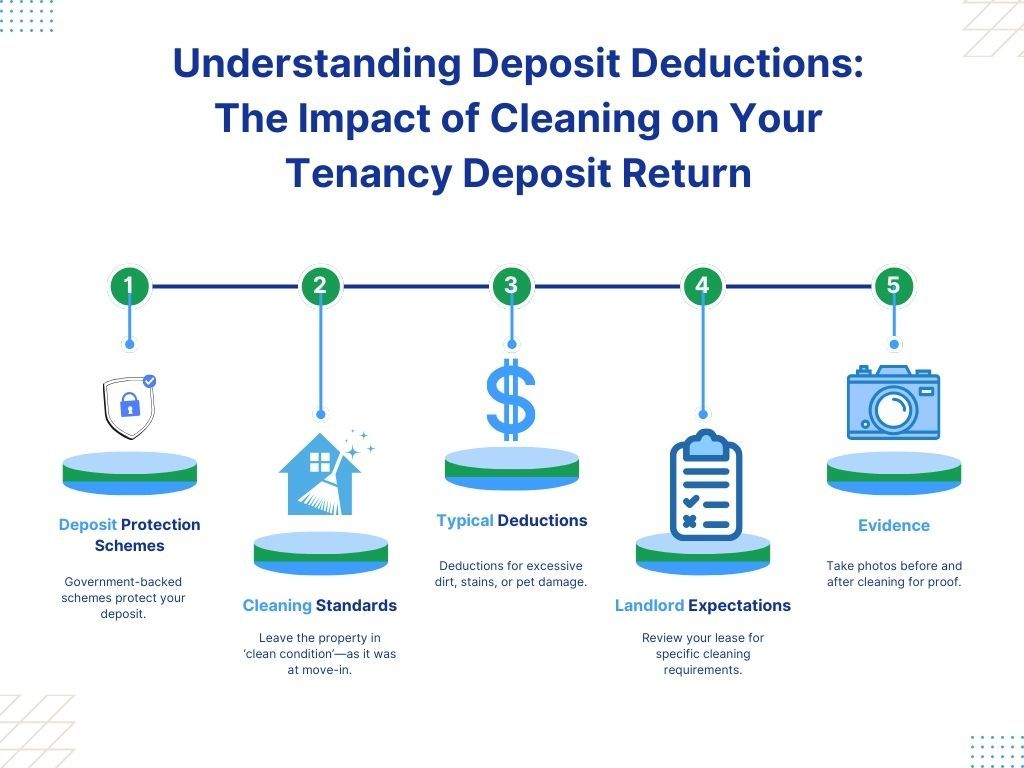
In the UK, the government-backed schemes protect the tenancy deposits. The schemes contain specific rules about the condition in which the property should be left. The schemes ensure that your deposit is returned if you meet the conditions of the tenancy agreement.
In case of disputes about the deposit return, the schemes offer dispute resolution services to help resolve conflicts between landlords and tenants.
The rental has to be cleaned to a professional standard and left as it was at the beginning of the tenancy. (often referred to as the ‘clean condition’). Typically, it means that it should be in the same state as when you moved in with consideration to normal wear and tear.
Some landlords or agreements may require a deep clean, especially if the property was professionally cleaned before you moved in.
Deductions may be made if there is excessive dirt, grime, or stains that were not present at the beginning of the tenancy. Pet-related damage, such as stains, odours, or hair, can also cause deductions for cleaning or repairs.
If certain areas of the property are not cleaned to the expected standard, the landlord may deduct the cost of additional cleaning services from your deposit.
Review your lease agreement for any specific clauses related to cleaning. Some agreements may have detailed requirements or expectations regarding the condition of the property. The inventory report works as a benchmark for the property's condition. Ensure that the property matches this report in terms of cleanliness.
Tenants need to take photos or videos of the property's condition before moving out, as well as after tidying. This way, they can prove the property's condition when they have moved out. It also helps support their case if there is a dispute over the deposit deductions.
Case no.1
A tenant at 25 Ecclesall Road, Sheffield, had £150 deducted from his deposit for professional carpet cleaning after he moved out. The landlord provided an invoice from Sheffield Carpet Cleaners showing the cost.
Case no.2
A person who rented a flat at Arundel Street, had £75 deducted from her deposit to cover the cost of repainting one bedroom wall that had several holes from picture hangings.
Case no.3
Two tenants at Bramall Lane, Sheffield, S2 4RE, had £200 deducted for excessive cleaning required after their tenancy ended, including oven cleaning and removal of mold in the bathroom. Invoices were provided.
REFERENCES
Sheffield City Council - Tenants' Responsibilities https://www.sheffield.gov.uk/home/housing/council-housing-tenants-responsibilities
Shelter - Responsibility for Repairs https://england.shelter.org.uk/housing_advice/repairs/responsibility_for_repairs
Citizens Advice - Tenancy Agreements https://www.citizensadvice.org.uk/housing/renting-privately/tenancy-agreements/
Deposit Protection Service - Cleaning Guide https://www.depositprotection.com/cleaning-guide
Dwell Residential Lettings (Sheffield) - Tenant Responsibilities https://www.dwellresidential.co.uk/tenant-info/responsibilities
The Deposit Protection Service (Tenancy Deposit Scheme) - Cleaning advice: https://www.depositprotection.com/learning/cleaning-advice
MyDeposits (Tenancy Deposit Scheme) - Cleaning guidance for tenants: https://www.mydeposits.co.uk/tenants/at-the-end-of-a-tenancy/cleaning-guidance/
RLA Guidance on Tenancy Deposits (From Residential Landlords Association): https://www.rla.org.uk/landlord/guides/tenancy-deposits-guide/cleaning.shtml
Gov.uk - Guide on how to rent and tenancy deposit protection: https://www.gov.uk/private-renting/ending-a-tenancy
End of Tenancy Cleaning Services Sheffield Your local move-in/out, deep and one-off cleaning professionals. Tel: 01146.972.227 Professional domestic deep cleaners expertise, the best experience, and affordable prices.
